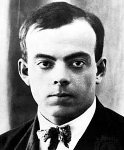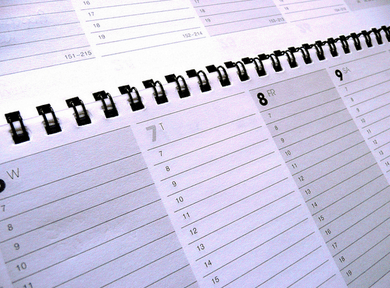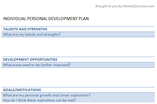I want you to think back on the past year in your life. Do you feel like you made significant progress in life? Can you say without the shadow of a doubt that you grew as a person during the last year? Or, did you catch yourself wasting important time on mindless activities that lead you nowhere? Do you feel like you have no control over your life, spending your days in a rush? If you finally want to kick gears in your development, then writing a personal growth plan is the #1 thing you can do. The power of having a precise plan lies in the fact that you are able to focalize all your activities in the right direction. This does not only give you more control over your life but will also help you to stop drifting along doing whatever comes to your attention.

“A goal without a plan is just a wish.”
― Antoine de Saint-Exupéry
Think of your personal development plan as an attack plan for your life. This plan is necessary for the battleground called life where you develop strategies, implement the tactics and arrange the necessary logistics for a prosperous future.
The importance of writing a personal development plan
Do you know exactly where you want to be in the future? Can you answer in great detail where you see yourself in one year—or even in five years?
Most people have no idea where they are going. They allow coincidence and luck to decide their fate. They all go somewhere, but more often than not this is a place where their own development is absolutely neglected. Don’t be one of them! Don’t let others decide over your life.

The importance of planning ahead is multifold. One benefit is that you will be confronted with the (sometimes daunting) question where you want to go. It’s an important question that should not be overlooked. If you have no destination, then it doesn’t matter where you go. If it doesn’t matter where you go, then you will eventually stop walking as lying around is more comfortable.
But once you start writing down what you want to achieve, you will drastically increase your chances of becoming the person you want to be. I can tell you from my own personal experience that whenever I committed myself to the thorough planning of realistic goals, I always managed to achieve what I wanted to accomplish. In one way or the other.
The importance of planning is further highlighted by scientific research, which has shown that writing down goals increases your chances of success.
Those who wrote their goals accomplished significantly more than those who did not write their goals.
Dr. Gail Matthews, Strategies for Achieving Goals
Let’s move on to the next question.
Why should you write a personal development plan?
The big advantages of having a personal growth plan include:
- Having a destination – Precise knowledge where you want to go
- Planning the path – You’ll develop strategies to reach the destination
- Knowing the obstacles – You’ll discover what obstacles could lead to failure
- Understanding the greater plan – You’ll know exactly why you are doing what needs to be done – even if the going gets tough
How to write a personal development plan?
The contents of a personal growth plan
The process of personal development planning revolves around the creation of an action plan that is based on your ambitions for development in areas such as career and education but also self-improvement. In general, the plan contains a statement of a future reality and the way you intend to realize it.
Most people are facing difficulties when it comes to the question what they should include in their personal development plan. Very broadly, your plan should contain the following five criteria:
- What you want (or where you want to be)
- Why you want it
- How you plan to accomplish this vision
- The potential obstacles, risks, and dangers
- How you plan to overcome the difficulties
You can also include alternative plans that you can quickly execute in the case of failure.
It can be beneficial to thoroughly answer the following questions, before developing the plan:
- What do I really want to make out of my life?
- What kind of a person do I really want to be?
- Do I have a vision that I want to see implemented in this world?
- What are my goals and ambitions?
- What are my dreams?
- Are my current decisions leading me exactly where I want to be?
As a side note, I recommend formulating goals using the SMART criteria:
- Specific – target a specific area in your life that you want to improve
- Measurable – specify how you want to measure progress
- Assignable – decide who will have to do it
- Realistic – sets goals that can realistically be achieved
- Time-related – specify when you want to accomplish the goal
Elements of the personal development plan
Planning isn’t difficult. What is difficult, though, is creating a plan that will actually get you where you want to be. This also means that you will have to identify everything that won’t get you closer to your goals.
This is what you need to do in order to specify your individual development plan:
1. Taking an inventory
Stocktaking might be the most difficult part of creating your PDP. It requires you, to be honest with yourself and the situation you find yourself in. The analysis of your current situation helps you to identify the areas that you can work on in the future.
This stage also requires you to reevaluate your goals and ambitions. More on this subject later in the section Personal Development Plan Examples.
2. Writing a mission statement
Having a personal mission statement can be helpful to people who want to be able to evaluate the purpose of their actions and activities. Such a statement helps you to ask yourself if whatever you are doing contributes to your mission, or not.
3. Short and long-term planning
When developing a personal development plan it is crucial to separate your plans into short, medium and long-term sections. If you are only planning in the long run, you will most likely neglect the importance of planning of short-term actions.
4. Reassessing your plan
The continuous reassessment of your plan allows you to develop responses to recent developments. It will further help you to meet better decisions at the present moment.
5. Committing and taking action
What is the purpose of having a plan if you do not execute it? Make sure that you won’t forget your plan. Be committed to it and take the action that is necessary to implement it.
The details of the plan
Your personal development plan should also detail how you plan to improve in what kind of areas. You can consider the following learning opportunities:
- Courses
- Workshops
- Reading/Literature
- Mentoring
- Networking
- Training on the job
- Joining groups
There are much more ways to gain exciting skills in new knowledge. Let’s continue with some examples.
Personal development plan examples
A personal growth plan can be broken down into the following areas:
1. What do I want to accomplish in life?
What’s the true purpose of my life?
The importance of knowing what you were born to do should not be underestimated. It gives you the necessary foundation on which you can build your plans for the future. However, discovering your life’s purpose is a complex process which takes time. For further reference consult: How to Discover Your Purpose in Life.
Example: It is my vision to help create a better world by making the world’s knowledge easily accessible for every human being.
What are my dreams?
We all grew up with the most ambitious dreams, only to lose sight of them once we grew older. Don’t make the mistake of rationalizing the very dreams away that inspire and motivate you.
2. What kind of a person do I really want to be?
What are my beliefs and values?
Ask yourself what it is that you stand for—the beliefs you hold and the values you appreciate.
Who am I now and who do I want to be in the future?
The analysis of who you are at this present moment and the person you want to be in the future helps you identify areas to work on.
3. What are my goals?
Don’t underestimate the importance of having realistic but inspiring goals. These goals should, preferably, be separated into short, medium and long-term goals. A short-term goal has at times been of approximately half a year. Medium-term goals approximately 1 to 3 years and long-term goals 5 years or more.
4. What are the necessary milestones?
Many people only focus on the setting of ambitious goals, without realizing the importance of also specifying the necessary milestones they need to accomplish. Having milestones allows you to break a goal down into several sub-goals. Doing so will allow you to maintain the necessary motivation, even when you are working on a long-term goal.
Personal development plan template
A personal development plan allows you to get an excellent impression of the direction your life is heading. I have prepared for you a free template that you can use to write down your goals.
You can download the personal development plan template here.

Tracking your progress
After you have finalized your personal development plan it is important to regularly track your own progress. After all, having a plan is important, but it is useless if you do not check whether or not you are following your plan.
For this purpose, make sure to write down records of your own accomplishments and the problematic areas that need more attention.
Celebrating your successes
I do not only recommend that you should celebrate each and every success on your journey but also would like to highlight the importance of rewarding yourself. Having an excellent reward in mind that you will only get once you have accomplished an important milestone will further increase your motivation to go the extra mile.
“Plans are only good intentions unless they immediately degenerate into hard work.”
Peter Drucker
What are your experiences with writing personal development plans? We’re excited to hear from you in the comment section below.
Further reading:




36 Comments
This is one great article. Developing your personality would really help you to be successful in all aspects of life. you can also join us at success permission as this will really be your guide.
Thanks a lot.
People of all kinds of plans for the professional life. But I never thought about writing down a personal plan for my own development. Thanks for pointing this out.
You’re very welcome.
Is it beneficial to write a personal development plan?
Yes indeed it is! Having a plan will allow you to better focus all your actions in the right direction. It’s like having a goal, it’s what keeps you going and will motivate you to seek improvements in all areas of your life. But on the other hand, if you don’t have a goal their actions are not focused enough, which will more often than not result in problems.
I’m too lazy to write a plan, but after reading this I think it could be important.
It absolutely is, and you will benefit greatly from it.
Writing a personal growth plan is a waste of time.
I don’t think so. Without having a plan a person’s actions might become unfocused. But if you do have a plan, you know what you have to do and why you have to do it.
hi can you help me in my pdp
Yup a waste of time for people that are not commited to their PDP.
This made me realize that I should probably develop such a personal development plan as well.
Fantastic!
Such great advise….so important to have the direction of a plan
Thanks, I’m glad you enjoyed the article.
Great ideas, never knew a personal development plan exists.
Thanks!
It’s very interested article. my problem is when I make a plan I forget after days.
I always recommend to write the plan down and to read it at least twice a day. This way you won’t forget it.
for most folks, I suspect they are preoccupied with work activities before and after designated work hours and really dont have the ‘spare’ time to allocate to spending on personal development…
the reality of life and employment these days is that employers expect employees to be available via phone or email practically 24hrs a day – whilst absurd, it is real. Employers provide smart phones for convenience and connectivity – and stupidly, most employees see this as a good thing.
When work starts in the office and ends in the office, then yes – people will have the time to review personal development, but until organisational culture changes or social expectations of work/life balance are adjusted into balance then for most, personal development is just a pipe dream.
you can combine your personal plans with your career/work goals, that way it wont be work and instead a personal development that will benefit all aspects of your life. How might you enlighten your organization and bring this to the foreground? Be the creative leader that you would want to see.
I could not agree more with you on this. I work with an organization that emphasizes work life balance and active PDP yet I am reminded that my industry is a 24 hour business that never sleeps, so I have phone, email, and laptop with 24 hours internet connectivity to ensure I can help customers, do my reports, plan my work and still have time for family and personal development. It’s like, do these employers actually think we are robots, still I like my company. So at the end of the day, the expectations from work, family and life is so great that you can’t help but just strut along…
I thank you so much for y
our guidance through personal development plan. but will like you to help me plan with a short summary.
Pls give me a personal development plan statement
Thank you so much for your article, im really starting to evolve now after 5 years of heavy depresion. I have known the problem for a while but this could really help me execute the plan by simply making 1. Thanks again!
You’re very welcome. I wish you all the best.
Great article, Steve. The most enlightening part of the process of creating your plan is in seeing all of the various options we have able. There are so many dimensions to our development. But without a clear plan, the whirlwind of distraction makes it difficult to build momentum.
I thought this would be a big waste of time. But as I read your article I think how was I getting thought life with out a plan.A plan is something that I am afraid of I have a good job, with good insurance I would think that is OK but it is not. When I want more out of life then just a job I want a career.
Fab article, thanks for sharing. I’m looking forward to reading your article on finding your purpose in life next but before I do, I just wanted to say…
I’ve been using Personal Development Plans for the last 5 years and the process has contributed greatly to my successes. I say the ‘process’ because I’ve always found the journey to be far more valuable than the final product. Of course, plans are useful but the insight you get from thinking about what you want and how to get it is immense!
As Eisenhower once said “I have always found that plans are useless, but planning is indispensable.”
This article is quite useful, I find it difficult to make plans, but I just realised that it would be of great help in my future dream position. please help me with a template to develop my.
Thanks so much for the great and healthier sharings about setting out a PDP… strongly I stand with and second you.
Also, its one of the key lessons under my recent book entitled: DEVELOPING A MASTER-SERVANT-HEART, which addresses a number of key selling points that each person needs to embrace for a quality livelihood at all disciplines.
My brother, STEVE MUELLER, I strongly agree with you.
Life without a goal (PDP) is not worth living and NOTE/ REMEMBER:
it is not important to the beholder and the society at large.
A personal development chart is like willing to do all kinds of work step by step. Thanks for this beautiful article.
Reading this article made me feel like I can do what I am achieving. I know that at times I feel like giving up but if I better manage my time, I know that I can’t achieve my goals.
Sincerely appreciated. I’m grateful for this wonderful article. Keep sharing!
My plan is writing now a need to let go of fear and move forward.